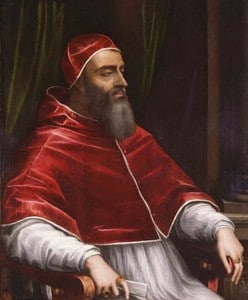 On this day in history, 7th March 1530, Pope Clement VII issued the following bull:
On this day in history, 7th March 1530, Pope Clement VII issued the following bull:
“Bull, notifying that on the appeal of queen Katharine from the judgment of the Legates, who had declared her contumacious for refusing their jurisdiction as being not impartial, the Pope had committed the cause, at her request, to Master Paul Capisucio, the Pope’s chaplain, and auditor of the Apostolic palace, with power to cite the King and others; that the said Auditor, ascertaining that access was not safe, caused the said citation, with an inhibition under censures, and a penalty of 10,000 ducats, to be posted on the doors of the churches in Rome, at Bruges, Tournay, and Dunkirk, and the towns of the diocese of Terouenne (Morinensis). The Queen, however, having complained that the King had boasted, notwithstanding the inhibition and mandate against him, that he would proceed to a second marriage, the Pope issues this inhibition, to be fixed on the doors of the churches as before, under the penalty of the greater excommunication, and interdict to be laid upon the kingdom.
Bologna, 7 March 1530, 7 Clement VII.” (LP iv. 6256)
Catherine of Aragon had made the Pope aware that Henry VIII was determined to marry Anne Boleyn and the Pope’s reaction to this disobedience was to threaten the King with excommunication. It didn’t work. Henry VIII continued doing everything he could to annul his first marriage, sending men to universities to canvas their opinion on whether his first marriage was contrary to God’s law.
In February 1531, Henry VIII claimed the title of “Sole Protector and Supreme Head of the Church of England”, although he had to compromise by adding “as far as allowed by the law of Christ, Supreme Head of the same.” This paved the way for the break with Rome and for the annulment of Henry’s marriage to Catherine. Henry VIII married Anne Boleyn in a secret ceremony in January 1533 and his first marriage was formally annulled in May 1533, shortly before Anne’s coronation.
As far as the break with Rome is concerned, it happened in stages with the March 1532 Act in Restraint of Annates being the first legal part of the process. This act limited annates (payments from churches to Rome) to 5%. In 1534 annates were abolished completely in the Act in Absolute Restraint of Annates. The 1533 Act in Restraint of Appeals began the process of transferring the power of the Church in Rome to Henry VIII and his government, and is seen as the starting point of the English Reformation. All appeals to the Pope were prohibited and the King was made the final authority on all matters.
Poor Catherine of Aragon could never have known that her refusal to accept the annulment and her appeal to Rome for the Pope’s support would lead to England breaking with her beloved church. In the days before she died, Catherine was consumed with worry that she was to blame for the ‘heresies’ and ‘scandals’ that England was now suffering from. They were, of course, not her fault.